Find Quotes
Results for "problem-reaction-solution" Showing 21-40 of 103 (0.05 seconds)

“clearly making a play for control of the shadow government,” he said. “He’s used their own tactic of the Hegelian Dialectic against them—create a problem, in this case the virus and a faulty vaccine; have the public react to it as they call for a solution; and then step in with a solution to the problem he created in the first place. The solution being the Blackstars and the new vaccine. Problem-Reaction-Solution. It’s classic manipulation.”
― Black Mirror
― Black Mirror
“What should a cold call sound like?* Reach prospect: Hi, is [First Name] in? Introduction:** Hi [First Name], this is [Name] at [Company], how are you doing? Permission: I called to see if what we do for [Problem] can benefit your team. Did I catch you with two minutes? Value proposition: We help [Buyer persona] who [Problem] by [Solution]. In fact, [Customer success story]. Question + leading statement: I’ve seen a lot of [Buyer persona] who are dealing with [specific facet of problem]. How are you addressing that today? Qualify for interest + fit: [This is the part you cannot script - you have to know what makes a qualified buyer and really listen to their answers.] Ask for the appointment: Well, you’ve been kind to give me a few minutes today and it sounds like there’s reason to continue the conversation. Do you have time this coming [Day] or [Day] that we can get into more detail and determine if there’s a mutual fit? *This structure demonstrates how a call can go if the prospect has no objections. It’s best to also script effective responses to common objections. **There is an entire school of thought around using uncommon conversation starters to take the prospect out of his or her standard reaction to cold calls. This strategy is smart and merits testing once you’re ready to focus on improving your call effectiveness.”
― Outbound Sales, No Fluff: Written by two millennials who have actually sold something this decade.
― Outbound Sales, No Fluff: Written by two millennials who have actually sold something this decade.

“Turn him loose, and the American White Man can and has whipped anything in sight. Sooner or later, the Jews will finally cross the borderline of American patience as they have done all throughout their history. When they do, the reaction of the American White Man will make the Jews get on their knees and pray for Adolf Hitler to save them. The revenge taken upon them by other outraged host people will seem like heaven compared to the ferocity of the White American, once he has had all he is going to take from these arrogant Jews. It is my hope to be organized and ready to channel this damned-up flood of righteous American rebellion against Jew tyranny, once it breaks loose, into CONSTRUCTIVE, rather than purely destructive directions. If I am successful, we can find a just solution to the Jewish problem. If I am unsuccessful, there will be Jews swinging from every lamp post in America.”
― White Power
― White Power

“Turn him loose, and the American White Man can and has whipped anything in sight. Sooner or later, the Jews will finally cross the borderline of American patience as they have done all throughout their history. When they do, the reaction of the American White Man will make the Jews get on their knees and pray for Adolf Hitler to save them. The revenge taken upon them by other outraged host people will seem like heaven compared to the ferocity of the White American, once he has had all he is going to take from these arrogant Jews. It is my hope to be organized and ready to channel this damned-up flood of righteous
American rebellion against Jew tyranny, once it breaks loose, into CONSTRUCTIVE, rather than purely destructive directions. If I am successful, we can find a just solution to the Jewish problem. If I am unsuccessful, there will be Jews swinging from every lamp post in America.”
― White Power
American rebellion against Jew tyranny, once it breaks loose, into CONSTRUCTIVE, rather than purely destructive directions. If I am successful, we can find a just solution to the Jewish problem. If I am unsuccessful, there will be Jews swinging from every lamp post in America.”
― White Power

“Landsteiner wasn’t finished. In 1919, he left Vienna and traveled to New York City to work at the Rockefeller Institute. While there, he took blood from rhesus monkeys and injected it into rabbits and guinea pigs, which allowed him to identify yet another protein on the surface of red blood cells called Rh (for rhesus monkey). This finding helped explain why some blood transfusions thought to have been with the right type of blood had still caused serious reactions. People with Rh negative blood can’t receive blood from someone who is Rh positive (about 85 percent of people are Rh positive). This is especially a problem during pregnancy when mothers who are Rh negative are carrying a baby who is Rh positive. The Rh-negative mother can react against her baby’s blood while the baby is still in the womb, with occasionally fatal results. This problem was so severe that until a solution could be found—inoculation of mothers with a product called RhoGAM—couples were prohibited by law to marry if the woman was Rh negative and the man was Rh positive.”
― You Bet Your Life: From Blood Transfusions to Mass Vaccination, the Long and Risky History of Medical Innovation
― You Bet Your Life: From Blood Transfusions to Mass Vaccination, the Long and Risky History of Medical Innovation

“Change the way you look at the world,
and the world you’re looking at changes. Yes, it is that simple. And let me repeat—I understand that your problems are big and overwhelming and real. The High 5 Habit doesn’t change those realities. It changes YOU. How you see yourself and what you are capable of achieving. How YOU see the world and what opportunities or solutions you can create. And it’s how YOU push yourself forward grounded in faith and belief that when you do, something amazing will happen. Every single day, your brain will start to get the new message about what’s important to YOU and to your future. It will fall in line and begin to filter the world in an entirely new way to help you get what you want. Seeing things differently won’t make your problems disappear, but it will have you seeing different solutions, different opportunities, and different possibilities that you haven’t seen before. And that makes all the difference in the world. The question is, aside from that high five, how else can I train my RAS to work for me? Brace yourself, this is going to sound just as silly as high fiving yourself in the mirror. At least, that was our daughter’s reaction. So let’s get those dark glasses off, chuck those horrible things you say in the trash, and start training your brain to see you and your future in a whole new way.”
― The High 5 Habit: Take Control of Your Life with One Simple Habit
and the world you’re looking at changes. Yes, it is that simple. And let me repeat—I understand that your problems are big and overwhelming and real. The High 5 Habit doesn’t change those realities. It changes YOU. How you see yourself and what you are capable of achieving. How YOU see the world and what opportunities or solutions you can create. And it’s how YOU push yourself forward grounded in faith and belief that when you do, something amazing will happen. Every single day, your brain will start to get the new message about what’s important to YOU and to your future. It will fall in line and begin to filter the world in an entirely new way to help you get what you want. Seeing things differently won’t make your problems disappear, but it will have you seeing different solutions, different opportunities, and different possibilities that you haven’t seen before. And that makes all the difference in the world. The question is, aside from that high five, how else can I train my RAS to work for me? Brace yourself, this is going to sound just as silly as high fiving yourself in the mirror. At least, that was our daughter’s reaction. So let’s get those dark glasses off, chuck those horrible things you say in the trash, and start training your brain to see you and your future in a whole new way.”
― The High 5 Habit: Take Control of Your Life with One Simple Habit

“God grant that there may come a reaction, and that the great principles of Anglo-Saxon liberty may be rediscovered before it is too late! But whatever solution be found for the educational and social problems of our own country, a lamentable condition must be detected in the world at large. It cannot be denied that great men are few or non-existent, and that there has been a general contracting of the area of personal life. Material betterment has gone hand in hand with spiritual decline. Such a condition of the world ought to cause the choice between modernism and traditionalism, liberalism and conservatism, to be approached without any of the prejudice which is too often displayed. In view of the lamentable defects of modern life, a type of religion certainly should not be commended simply because it is modern or condemned simply because it is old. On the contrary, the condition of mankind is such that one may well ask what it is that made the men of past generations so great and the men of the present generation so small. In the midst of all the material achievements of modern life, one may well ask the question whether in gaining the whole world we have not lost our own soul. Are we forever condemned to live the sordid life of utilitarianism? Or is there some lost secret which if rediscovered will restore to mankind something of the glories of the past? Such a secret the writer of this little book would discover in the Christian religion. But the Christian religion which is meant is certainly not the religion of the modern liberal Church, but a message of divine grace, almost forgotten now, as it was in the middle ages, but destined to burst forth once more in God’s good time, in a new Reformation, and bring light and freedom to mankind. What that message is can be made clear, as is the case with all definition, only by way of exclusion, by way of contrast. In setting forth the current liberalism, now almost dominant in the Church, over against Christianity, we are animated, therefore, by no merely negative or polemic purpose; on the contrary, by showing what Christianity is not we hope to be able to show what Christianity is, in order that men may be led to turn from the weak and beggarly elements and have recourse again to the grace of God.”
― Christianity & Liberalism
― Christianity & Liberalism

“But scientific progress, he wrote, almost always comes from trying to apply new knowledge to solve problems: ‘significant progress in the solutions of technical problems is frequently made not by a direct approach, but by first setting a goal of high challenge which offers a strong motivation for innovative work, which fires the imagination and spurs men to expend their best efforts, and which acts as a catalyst by including chains of other reactions.”
― Mission Economy: A Moonshot Guide to Changing Capitalism
― Mission Economy: A Moonshot Guide to Changing Capitalism

“the weakening of the discourses constructing political identities in terms of left and right has not meant the disappearance of the need for a we/they distinction. Such a distinction is still very much alive; however, today it is increasingly established through a moral vocabulary. We could say that the distinction between left and right has been replaced by the one between right and wrong. This indicates that the adversarial model of politics is still with us, but the main difference is that now politics is played out in the moral register, using the vocabulary of good and evil to discriminate between 'we the good democrats' and 'they the evil ones'. This can be seen, for instance, in the reactions to the rise of right-wing populist parties, where moral condemnation has generally replaced a properly political type of struggle. Instead of trying to grasp the reasons for the success of right-wing parties, the 'good' democratic parties have often limited themselves to calling for a 'cordon sanitaire' to be established in order to stop the return of what they see as 'the brown plague'. Another example of this moralization of politics is when President George W. Bush opposes the civilized 'us' to the barbarian 'others'. To construct a political antagonism in this way is what I call the 'moralization of politics'. This is something that we can see at work in many different areas nowadays; the inability to formulate the problems facing society in a political way and to envisage political solutions to these problems leads to framing an increasing number of issues in moral terms. This is, of course, not good for democracy because when the opponents are not defined in a political but in a moral way, they cannot be seen as adversaries, but only as enemies. With the evil ones, no agonistic debate is possible. They have to be eliminated.”
― Agonistics: Thinking the World Politically
― Agonistics: Thinking the World Politically
“I wanted to help rescue this species from endangerment by learning about the elephants’ intricate social structure, increasing worldwide attention to this species through my research and scientific advancements in knowledge. However, when the scientific papers that I had spent years writing finally came out, there was little reaction. I felt proud of my scientific accomplishments but was sad that I wasn’t doing more for the species that I cared about so much. The following year after I graduated, a new paper by one of my colleagues in Gabon found that between 2002-2011, the duration of my Ph.D. plus a few years, over 60% of the entire forest elephant population declined due to poaching[5]. The poaching was almost exclusively driven by the consumption of their tusks as sources for carving statues, jewelry, and other decorative objects. The true conservation issue had nothing to do with studying the elephants themselves. What was the point of studying a species if it might not exist in a few decades? If I really wanted to help forest elephants, I should have been studying the people, the consumers who were purchasing ivory to determine if there were ways to change attitudes towards ivory and purchasing behavior. Yes, having rangers on the ground to protect parks and elephants is important, but if there is no decrease in demand, it will constantly be an uphill battle. All of the solutions to the conservation problems of forest elephants are social, political, and economic first. If you are interested in pursuing wildlife biology as a career for conservation purposes (like I was) or because you love animals (also me), you might be better suited in another career if research is not your thing but can still work for a conservation organization. Nonprofits need lawyers, financial planners, fundraising experts, and marketing executives to name a few. When I perused the job boards of nonprofit organizations, I was surprised by how few research positions there were. There were far more in fundraising, marketing, and development. Even if you don’t work directly for conservation, honestly, you can still make a difference and help conservation efforts in other ways outside of your career. A lot of conservation is really about investing in programs and habitat, so species stay protected. For example, if you can purchase and/or donate money to organizations that buy large areas of land, this land can be set aside for wildlife conservation. The biggest threat to wildlife is habitat loss and simply buying more land, keeping it undeveloped, and/or restoring it for species to live on, is one of the major means to solve the biodiversity crisis.”
― Getting a Job in Wildlife Biology: What It’s Like and What You Need to Know
― Getting a Job in Wildlife Biology: What It’s Like and What You Need to Know
“STOP THINKING AND START LIVING - Many times we think and never conclude our thoughts , the life is a unending game of action and reaction, when the choices are unpleasant or limited I leave it to almighty to decide my future, and I find many surprises, many of our problems are imaginary neither they exist nor have solutions. Engaging the mind with positive thoughts continues to be simple solution to our lives. Dr T.V.Rao MD”
―
―

“A chain reaction of rapid technological development across science and technology is unlocking brand new and novel solutions, and with them come unprecedented new opportunities to solve major human problems.”
― Rebuilding You: The Philanthropy Handbook
― Rebuilding You: The Philanthropy Handbook

“When a woman is upset about something, men either want to suggest a solution (which is why they interrupt) or encourage her to forget it, and while she is talking about it, they can do neither. But there’s another reason men often interrupt women when they are upset and talking about a problem: they incorrectly interpret her strong emotional reaction to moderate external stress. A man wrongly assumes that if a woman is getting upset then it is because she can’t solve her problems on her own. He interprets her stronger emotional response as an urgent need for help, and then tries to give it.”
― Beyond Mars and Venus: Relationship Skills for Today's Complex World
― Beyond Mars and Venus: Relationship Skills for Today's Complex World

“When their partners, especially those with strong Fe expressiveness, come to them with an urgent need for support or reassurance, INTPs may find themselves feeling angry or spiteful rather than compassionate. This response is not intentional, but is more of a knee-jerk reaction stemming from feelings of powerlessness and ineptitude. This problem also ties into the fact that INTPs fail to experience empathy to the degree that Feeling types do. INTPs do not want to feign empathy, as it feels awkward and inauthentic. So all they feel capable of doing is proffering potential solutions in a Ti-Ne
fashion, which may leave their support-seeking partner feeling frustrated and unsatisfied. This dissatisfaction may, in turn, further fuel INTPs’ sense of spite and anger, since they feel they are being asked to function inauthentically and “out of their element.”
― The INTP: Personality, Careers, Relationships, & the Quest for Truth and Meaning
fashion, which may leave their support-seeking partner feeling frustrated and unsatisfied. This dissatisfaction may, in turn, further fuel INTPs’ sense of spite and anger, since they feel they are being asked to function inauthentically and “out of their element.”
― The INTP: Personality, Careers, Relationships, & the Quest for Truth and Meaning

“F YOUR REACTION to problems was to shoot them, there would eventually be a problem where that was the solution.”
― With Honor Intact
― With Honor Intact
“Like his colleague Thomas, he viewed prejudice as a form of instinct, but where Thomas set it down to a reaction to the Other’s physical appearance, Park saw in it a manifestation of competition: Race prejudice may be regarded as a spontaneous, more or less instinctive defense-reaction, the practical effect of which is to restrict free competition between races. Its importance as a social function is due to the fact that free competition, particularly between people with different standards of living, seems to be, if not the original source, at least the stimulus to which race prejudice is the response.48 Park’s reference to free competition hinted at the strains being placed on society in a postwar context in which massive foreign (and particularly Asian) immigration had resumed. He argued that where fundamental racial interests are not yet controlled by law, custom, or other arrangement between the groups in question, racial prejudice will inexorably develop. It may, however, be deflected by ‘the extension of the machinery of cooperation and social control’ – in the U.S. case, the caste system and slavery: we may regard caste, or even slavery, as one of those accommodations through which the race problem found a natural solution. Caste, by relegating the subject race to an inferior status, gives to each race at any rate a monopoly of its own tasks. When this status is accepted by the subject people, as in the case where the caste or slavery systems become fully established, racial competition ceases and racial animosity tends to disappear ... Each race being in its place, no obstacle to racial cooperation exists.49 This paper shows that Park’s thought in 1917 was not free of obfuscation and bias. One finds him maintaining that while ‘caste and the limitation of free competition is economically unsound,’ it is nonetheless ‘politically desirable’50 because”
― African American Pioneers of Sociology: A Critical History
― African American Pioneers of Sociology: A Critical History

“Each tribe’s solution to its central problem is a brilliant, hard-won advance. But the true Master Algorithm must solve all five problems, not just one. For example, to cure cancer we need to understand the metabolic networks in the cell: which genes regulate which others, which chemical reactions the resulting proteins control, and how adding a new molecule to the mix would affect the network. It would be silly to try to learn all of this from scratch, ignoring all the knowledge that biologists have painstakingly accumulated over the decades. Symbolists know how to combine this knowledge with data from DNA sequencers, gene expression microarrays, and so on, to produce results that you couldn’t get with either alone. But the knowledge we obtain by inverse deduction is purely qualitative; we need to learn not just who interacts with whom, but how much, and backpropagation can do that. Nevertheless, both inverse deduction and backpropagation would be lost in space without some basic structure on which to hang the interactions and parameters they find, and genetic programming can discover it. At this point, if we had complete knowledge of the metabolism and all the data relevant to a given patient, we could figure out a treatment for her. But in reality the information we have is always very incomplete, and even incorrect in places; we need to make headway despite that, and that’s what probabilistic inference is for. In the hardest cases, the patient’s cancer looks very different from previous ones, and all our learned knowledge fails. Similarity-based algorithms can save the day by seeing analogies between superficially very different situations, zeroing in on their essential similarities and ignoring the rest. In this book we will synthesize a single algorithm will all these capabilities:”
― The Master Algorithm: How the Quest for the Ultimate Learning Machine Will Remake Our World
― The Master Algorithm: How the Quest for the Ultimate Learning Machine Will Remake Our World
“All of us have felt like getting away, just packing our bags and saying, “I’ve had enough! I can’t take anymore! I’ve got to get away.” It’s a normal, natural reaction. But it is not a good solution to any problem. We usually take our problems with us. We can go on vacation and enjoy a short respite. But when we return, the battles and burdens are still there. In fact, sometimes when we try to run away, we only make the problems worse. Why does the Lord allow us to go through windy storms and tempests? They help us grow and mature. If we keep running away, we are like children who never grow up. No, we don’t need the wings of a dove to fly away. We need the wings of an eagle. Isaiah 40:31 says, “Those who wait on the Lord shall renew their strength; they shall mount up with wings like eagles.” The eagle faces the storm, spreads his great wings, and allows the wind to lift him above the storm. Don’t run away. Run to the Lord, and let Him lift you high above the storm.”
― Prayer, Praise & Promises: A Daily Walk Through the Psalms
― Prayer, Praise & Promises: A Daily Walk Through the Psalms
“The Wall Street Journal (The Wall Street Journal) - Clip This Article on Location 1055 | Added on Tuesday, May 5, 2015 5:10:24 PM OPINION Baltimore Is Not About Race Government-induced dependency is the problem—and it’s one with a long history. By William McGurn | 801 words For those who see the rioting in Baltimore as primarily about race, two broad reactions dominate. One group sees rampaging young men fouling their own neighborhoods and concludes nothing can be done because the social pathologies are so overwhelming. In some cities, this view manifests itself in the unspoken but cynical policing that effectively cedes whole neighborhoods to the thugs. The other group tut-tuts about root causes. Take your pick: inequality, poverty, injustice. Or, as President Obama intimated in an ugly aside on the rioting, a Republican Congress that will never agree to the “massive investments” (in other words, billions more in federal spending) required “if we are serious about solving this problem.” There is another view. In this view, the disaster of inner cities isn’t primarily about race at all. It’s about the consequences of 50 years of progressive misrule—which on race has proved an equal-opportunity failure. Baltimore is but the latest liberal-blue city where government has failed to do the one thing it ought—i.e., put the cops on the side of the vulnerable and law-abiding—while pursuing “solutions” that in practice enfeeble families and social institutions and local economies. These supposed solutions do this by substituting federal transfers for fathers and families. They do it by favoring community organizing and government projects over private investment. And they do it by propping up failing public-school systems that operate as jobs programs for the teachers unions instead of centers of learning. If our inner-city African-American communities suffer disproportionately from crippling social pathologies that make upward mobility difficult—and they do—it is in large part because they have disproportionately been on the receiving end of this five-decade-long progressive experiment in government beneficence. How do we know? Because when we look at a slice of white America that was showered with the same Great Society good intentions—Appalachia—we find the same dysfunctions: greater dependency, more single-parent families and the absence of the good, private-sector jobs that only a growing economy can create. Remember, in the mid-1960s when President Johnson put a face on America’s “war on poverty,” he didn’t do it from an urban ghetto. He did it from the front porch of a shack in eastern Kentucky’s Martin County, where a white family of 10 eked out a subsistence living on an income of $400 a year. In many ways, rural Martin County and urban Baltimore could not be more different. Martin County is 92% white while Baltimore is two-thirds black. Each has seen important sources of good-paying jobs dry up—Martin County in coal mining, Baltimore in manufacturing. In the last presidential election, Martin Country voted 6 to 1 for Mitt Romney while Baltimore went 9 to 1 for Barack Obama. Yet the Great Society’s legacy has been depressingly similar. In a remarkable dispatch two years ago, the Lexington Herald-Leader’s John Cheves noted that the war on poverty sent $2.1 billion to Martin County alone (pop. 12,537) through programs including “welfare, food stamps, jobless benefits, disability compensation, school subsidies, affordable housing, worker training, economic development incentives, Head Start for poor children and expanded Social Security, Medicare and Medicaid.” The result? “The problem facing Appalachia today isn’t Third World poverty,” writes Mr. Cheves. “It’s dependence on government assistance.” Just one example: When Congress imposed work requirements and lifetime caps for welfare during the Clinton administration, claims of disability jumped. Mr. Cheves quotes”
―
―

“significant progress in the solutions of technical problems is frequently made not by a direct approach, but by first setting a goal of high challenge which offers a strong motivation for innovative work, which fires the imagination and spurs men to expend their best efforts, and which acts as a catalyst by including chains of other reactions.”
― Letters of Note: Correspondence Deserving of a Wider Audience
― Letters of Note: Correspondence Deserving of a Wider Audience
All Quotes
|
My Quotes
|
Add A Quote
Browse By Tag
- Love Quotes 101.5k
- Life Quotes 79.5k
- Inspirational Quotes 76k
- Humor Quotes 44.5k
- Philosophy Quotes 31k
- Inspirational Quotes Quotes 29k
- God Quotes 27k
- Truth Quotes 25k
- Wisdom Quotes 24.5k
- Romance Quotes 24.5k
- Poetry Quotes 23.5k
- Life Lessons Quotes 22.5k
- Quotes Quotes 21k
- Death Quotes 20.5k
- Happiness Quotes 19k
- Travel Quotes 18.5k
- Hope Quotes 18.5k
- Faith Quotes 18.5k
- Inspiration Quotes 17.5k
- Spirituality Quotes 15.5k
- Relationships Quotes 15.5k
- Life Quotes Quotes 15.5k
- Religion Quotes 15.5k
- Motivational Quotes 15.5k
- Love Quotes Quotes 15k
- Writing Quotes 15k
- Success Quotes 14k
- Motivation Quotes 13k
- Time Quotes 13k
- Motivational Quotes Quotes 12.5k

